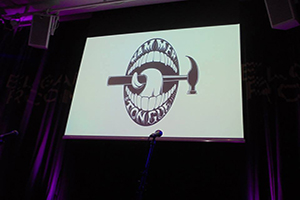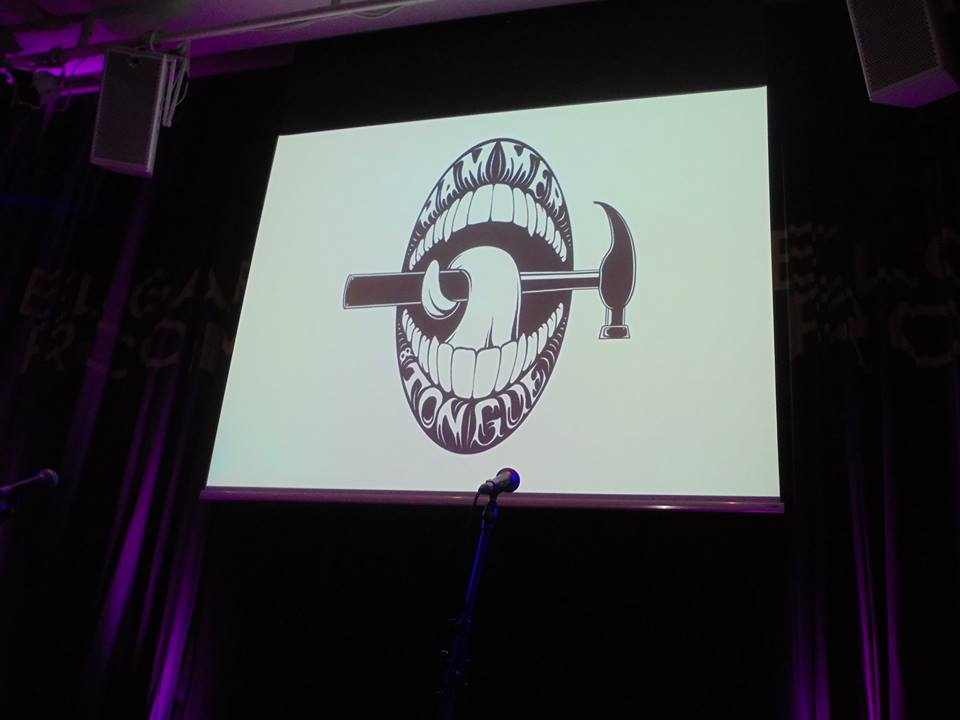The Hammer and Tongue National Poetry Slam is a marathon – 48 individual poets competing for the main title alongside a team slam from 7 teams across the UK and another 5 headliners from the world of spoken word and comedy across 2 days. The Royal Albert Hall’s Elgar Room is an auspicious venue for such an event and definitely helps draw poets from across the UK to compete in what is probably the largest event of its kind. The tournament works a bit like world cup rules, theres an initial group stage followed by quarters, semis and a final with poets winning Hammer and Tongue’s annual competitions getting a bye straight into the quarter finals on the second day. It also follows the standard slam rules as created by Marc Smith in Chicago in 1986, 5 judges picked by random from the audience who give each poet a mark out of 10. The top and bottom scores are immediately discounted, to give each poet a score out of 30 from 3 judges. If a poet runs over 3 minutes a time penalty encures and is taken off their total score.
Day 1 begins with introductions from Hammer and Tongue founder Steve Larkin followed by a strong set from last year’s winner Vanessa Kissule. After that we’re straight into the individual qualifying rounds from poets who qualified in the Edinburgh Festival. Theres good performances all round, but by my reckoning Sheffield’s Sarah Thomasin’s poem about her own stuggles with social anxiety and aspergers must have been in the top 3 scoring poems of the day. Theres strong performances from others including Rowan Mcabe whose poem about seagulls is delightfully off kilter. There is the first upset though, Louise Fazackerley despite clearly being a crowd favourite is knocked out because she encures a time penalty. The audience groans from the injustice as the scores are projected at the end of her round. Theres also very strong performances from Scott Tyrell and Miko Berry. They both tie the perfect line between humour and pathos and for me were the stand out performers of the first day and my favourites for taking home the individual title.
The day ended with the team slam which as far as I was aware was a first for Hammer and Tongue. Over in the states, the national team slam is a huge affair, with teams entered from each national state. These and the youth poetry slam ‘Brave New Voices’ are huge occasions. These poems seem almost built to be shared via upworthy and buzzfeed, 3 minute bitesize chunks of sharp political poetry aimed at America’s classist, sexist, heteronormative jugular. I don’t know whether its because we’re British, or the form is so much less developed over here but our team slam is a little less polished affair. None of the teams really take best use of the form – the short, sharp choreographed movements and gestures that American teams use to such effect aren’t utilised here. That said, its still incredibly enjoyable to watch, a special mention has to go to the Cambridge team for their exploration of a man’s dilemna between pie, sexual conquest and the last train home. Its a great day, and a credit to Hammer and Tongues’ organisation that to sit from 2pm – 10pm with a handful of 20 minute intervals without the show lagging too much is an achievement that must have taken a fair few spreadsheets and a tight fisted stage manager. Its only at the end of the day, the energy begins to lag as over a third of the audience have called it a night early and some of the energy is dissipated from the room.
Day 2 begins at the more comfortable hour of 5pm this time round. I arrive before doors open and get a pint in early. As I watch the great and good of spoken word mill through the cafe bar it does occur to me the diversity of the performers and the audience is something to celebrate here. Theres a real mix of different demographics here and although all are on the left of the political spectrum you get a real sense of slam poetry becoming a pluralist platform that can host multiple voices and styles and appeal to a wide range of people.
The day begins with the ‘losers’ plate as co host Sam Berkson puts it of the team slam which again is enjoyable if lacking the certain slickness that the individual heats have. Then we head back to the individual slams – the top winners from the first day progress to this stage alongside the winners of Hammer and Tongue’s regional annual heats so there are performers here the audience see for the first time too. There are great moments here – obviously declaring personal bias, Sheffield’s Gevi Carver gets herself into the semi final with a strong anthem about never growing up or taking yourself too seriously. Michael Clarke’s opening Corinthian poem could possibly be one of the best things I hear all weekend. Ken Rich savages Basingstoke with an entire alliterative poem with each word beginning with the letter B. However there are more upsets – Scott Tyrell is knocked out of a strong group despite achieving all round belly laughs and Miko Berry runs over time with the penalty also taking him out of proceedings. Slam hardened poets remain, and although the quality of performance is very high, for me some of the poems begin to lack some of the subtlety and variety of earlier rounds and the conventions of an overly wrought narrator that can be divisive in slam begin to creep in. The final is between three poets, who are all well known performers in the london scene and the competition is still all to play for. Solomon OB is the rightful winner of the last round, his performance begins as soon as he walks onto the mic, convulsing across the stage. The performance did leave me wondering slightly how it would translate to poetry’s more natural habitat – 30-50 person open mic nights in function rooms above pubs but he reads this occasion perfectly to be crowned the Hammer and Tongue Slam Champion of 2016.

